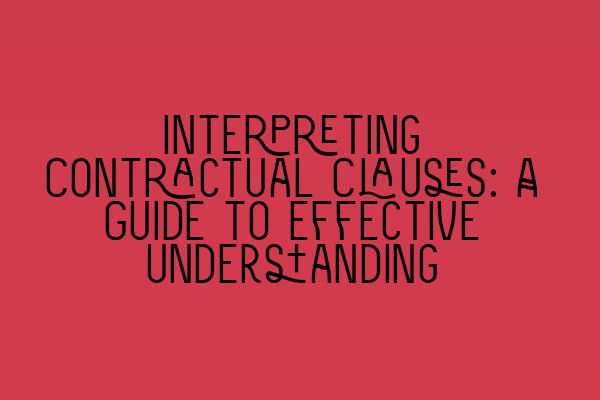Interpreting Contractual Clauses: A Guide to Effective Understanding
When it comes to contract law, interpreting contractual clauses accurately is essential to ensure that all parties involved have a clear understanding of their rights and obligations. However, deciphering complex legal language can often be a daunting task. In this guide, we will provide you with valuable insights and tips on interpreting contractual clauses effectively.
1. Read the Entire Contract
Before diving into the individual clauses, it is crucial to read the entire contract thoroughly. Familiarize yourself with the context, purpose, and overall structure of the agreement. By doing this, you will gain a comprehensive understanding that will aid in interpreting the specific clauses.
If you’re preparing for the SQE examinations, familiarizing yourself with contract law is an important step. You can test your knowledge by practicing with the SQE 1 Practice Exam Questions or taking the SQE 1 Practice Mocks FLK1 FLK2. These resources will help you sharpen your skills and enhance your understanding.
2. Identify Key Terminology
Contractual clauses often contain specific legal terms and jargon. Take the time to identify and define these terms to avoid any misinterpretations. It is advisable to consult legal dictionaries or seek professional advice to ensure you grasp the intended meaning accurately.
3. Analyze the Language
The language used in contractual clauses is meant to be precise and explicit. Analyzing the wording of each clause is crucial in understanding its implications. Pay attention to verbs, nouns, and adjectives as they can significantly impact the interpretation of the provision.
4. Consider the Surrounding Context
A contractual clause does not exist in isolation. It is vital to examine the clause in the context of the entire agreement. Look for cross-references to other clauses and consider how they relate and interact with each other. This holistic approach will provide valuable insights into the specific clause’s purpose and interpretation.
If you’re looking to ace the SRA SQE exams and require comprehensive preparation, consider enrolling in SQE 1 or SQE 2 preparation courses offered by reputable institutions like SQE Contract Law. These courses are designed to equip you with the necessary knowledge and skills to excel in the exams.
5. Incorporate Statutory Interpretation Principles
When interpreting contractual clauses, it may be necessary to reference statutory interpretation principles. These principles guide the courts in understanding and applying legislation. By considering these principles, you can ensure a consistent and accurate interpretation of the contractual provisions.
6. Seek Professional Guidance
If you encounter complex or ambiguous contractual clauses, seeking professional legal advice is recommended. Solicitors with expertise in contract law can provide valuable insights and help you navigate complex provisions. They can offer guidance specific to your situation, allowing for a more accurate interpretation and understanding.
To stay up to date with the latest SQE exam dates and other important information, refer to the SRA SQE Exam Dates page. These dates will help you plan your preparation and ensure you are well-prepared when it’s time to sit for the exams.
Conclusion
Interpreting contractual clauses requires careful analysis and attention to detail. By following the steps outlined in this guide, you can enhance your understanding and ensure an accurate interpretation of the provisions. Remember to read the entire contract, identify key terminology, analyze the language used, consider the surrounding context, incorporate statutory interpretation principles, and seek professional guidance when necessary. With practice and knowledge, you can master the skill of interpreting contractual clauses effectively.
